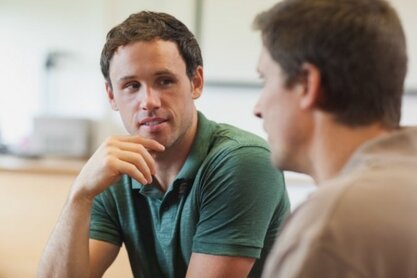
It can be really hard to tell your story to someone, and many people don’t want to have to talk about it again and again, so it is important to find the right person.
It is perfectly normal to ‘shop around’ for a counsellor, and spend a preliminary session with someone asking them questions and making sure that they are going to understand enough about your sexuality or gender to support you appropriately.
If you feel as if you are not getting appropriate answers to your questions, it is also okay to leave.
It is okay to ask for anything you want.
Some of the questions you might want to consider asking are:
It is perfectly normal to ‘shop around’ for a counsellor, and spend a preliminary session with someone asking them questions and making sure that they are going to understand enough about your sexuality or gender to support you appropriately.
If you feel as if you are not getting appropriate answers to your questions, it is also okay to leave.
It is okay to ask for anything you want.
Some of the questions you might want to consider asking are:
QUESTION: What do you know about people of my sexuality? (i.e. – what do you know about bi men?)
LOOK FOR: Honesty. It is better for the counsellor to say ‘gosh, I know nothing’ than to say a whole lot of things that they’re making up on the spot.
You want to listen for things that resonate with you. If anything they say makes you feel weird or uncomfortable or angry, then it might be better to be talking to someone else.
A good counsellor will definitely challenge you to stretch your thinking, but you are the expert on your own sexuality, not them.
QUESTION: What do you know about trans people? (or non-binary people for example – it is okay to ask specifically about your gender)
LOOK FOR: A client-centred approach. This means they will put *you* at the centre of the therapy. You need to know that they will not misgender you during therapy and that you will not be an *exciting* or *different* project for them.
A good counsellor will be honest about how much they know and will reassure you that they are not transphobic.
It is not okay for the counsellor to ask you lots of questions about what it means to be trans, but they might ask you what it means for *you*.
QUESTION: Have you worked with other people of my sexuality/gender?
LOOK FOR: Reassurance. Check that they either have experience or that they will do their own homework to understand the issues you might be facing better.
A counsellor should never tell you any details about anyone else they have worked with.
QUESTION: If I want to talk about something that you don’t understand, where will you go to find out about it?
LOOK FOR: Reassurance that they will look for information in appropriate spaces. They might attend workshops, connect with Rainbow organisations for professional development, approach a mentor or do some reading.
It is not appropriate for them to ask friends or family who are ‘Rainbow’.
QUESTION: Have you got access to anyone who can support you about trans issues, or issues relating to my sexuality?
This could be a follow up question to the previous question. It is okay for you to ask questions more than once to reassure yourself.
QUESTION: What will you do to maintain my confidentiality?
LOOK FOR: Reassurance that your counsellor understands that some of the communities in Aotearoa New Zealand are small and that if they are from a Rainbow community themselves, there may be points of connection and they will have to manage that.
What will they do if they see you out at an event? What will they do if you have mutual friends or acquaintances?
QUESTION: What is your understanding of homophobia, biphobia, transphobia etc?
LOOK FOR: Your counsellor’s understanding that these issues impact us, and what some of the things we face might be.
Do they understand how biphobia leads to people dismissing bi men’s experiences of sexual violence because they are expected to be ‘up for it’?
Are they going to understand sex-on-site venues?
QUESTION: Have you worked with other adult survivors of child sexual abuse?
LOOK FOR: Your counsellor having several years’ worth of demonstrated experience.
QUESTION: Have you worked with adult survivors of adult sexual assault?
LOOK FOR: Your counsellor having several years’ worth of demonstrated experience.
